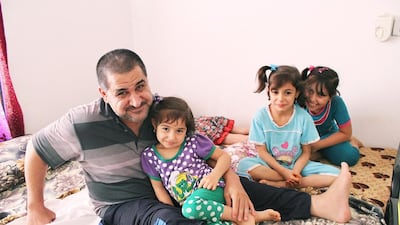ERBIL // Thousands of Sunni Arabs are streaming into Iraq’s autonomous Kurdish region to escape the fighting in Anbar province and a sectarian backlash in government-held areas.
With land crossings blocked by the conflict, most fly into Kurdistan from Baghdad, eschewing the option of staying in the capital for fear of reprisals by Shiite militias.
The fall of Ramadi, capital of Sunni-majority Anbar province, to ISIL last month triggered the latest exodus from the province, which is largely under the extremists’ control.
The UN says about 250,000 people have been displaced since fighting escalated in Ramadi on April 9, about half of whom left after the city fell on May 15.
There are no official figures on how many have made their way to the Kurdish region, but Falah Mustafa Bakir, minister of foreign relations in the Kurdish Regional Government (KRG), told The National that about 50,000 people from Anbar had arrived since Ramadi fell.
“Most of them have come in through airlines. From Baghdad to Erbil and maybe also to Suleimaniya as well,” he said.
Humanitarian organisations put the number at about 25,000, with more arriving daily.
“Every day we hear of more displaced people who have arrived from Baghdad,” said Nora Gatto, a community organiser at Un Ponte Per, an Italian NGO that helps the newly arrived receive basic services.
The KRG has already taken in more than a million displaced Iraqis — about a third of the country’s total — as well as about 240,000 Syrian refugees. Its sprawling network of refugee camps is packed to the brim, and many people who fled the fighting in Anbar have found shelter in areas outside of cities such as Erbil or nearby Shaqlawa, where rents are more affordable.
In Sara Baland, a dusty town several kilometres from Erbil, a newly developed housing complex has become a sizeable community of Anbar Arabs. Here, Haqqi Ismail Nasar pays 450,000 Iraqi dinars (Dh1,419) a month for a small house for himself, his wife and their seven children. The family left Ramadi two months ago.
“We never considered going anywhere but the KRG. We won’t find the security anywhere else,” Mr Nasar said.
His sister Iqbal came to the KRG around the same time. She left an ISIL-controlled city north-west of Ramadi named Hit after the militants denied her treatment at the local hospital for wounds she had received during a coalition airstrike on the city.
It took her 10 days to reach the Bzebiz bridge that crosses the Euphrates into Baghdad governorate. Still bleeding from wounds to her chest, arms and legs, she was stopped at a checkpoint, where members of a Shiite militia threatened to arrest her teenage nephew, who was accompanying her on the dangerous trip. The armed men relented after she pleaded, but warned them not to come back.
“Because of this incident, I decided not to get medical treatment in Baghdad, and left the city and waited until my husband came with plane tickets to Erbil,” she said.
Several Anbaris in Sara Baland spoke of their fear of Shiite militias, who they claimed abduct Sunnis at checkpoints, many of whom are never seen again. The militia groups that retook Tikrit from ISIL in April have been accused of widespread looting, revenge killings and destruction in the Sunni city, and reports of sectarian violence against Sunnis seeking refuge in Baghdad abound.
“When we see a checkpoint, we don’t feel safe. We don’t feel safe under ISIL, and we don’t feel safe with the militia or the Iraqi army,” said Wahar Yousif, primary schoolteacher. He left Baghdad for Fallujah, in 2006 after his brother was abducted and his house burnt down amid an outbreak of Shia-Sunni violence. He moved Sara Baland with his family at the beginning of the year to escape the chaos of southern Iraq.
Hamid Sami Serdan, a former air force pilot, came to the KRG with his family six months ago after getting caught in a firefight in Ramadi at the beginning of last year, when ISIL began to make its presence felt in Anbar’s capital.
The bullet hit his spine, leaving him paralysed, yet he refused to seek treatment in Baghdad for fear of being killed, travelling to India and Jordan for medical help instead. As a former member of Sunni dictator Saddam Hussein’s armed forces, Shiite-dominated Baghdad is not a safe place, said Mr Serdan.
“From my graduation year, only four of us are still alive, the rest have been assassinated,” he said.
Several of his friends are stuck in Baghdad
Demand for plane tickets to Erbil on the state-owned Iraqi airlines is huge, and waiting lists long, but the government seems keen to help. According to several displaced people and aid agencies, the central government has promised to pay the airfare to the KRG for Anbaris stuck in Baghdad.
With so many refugees overwhelming the Kurdish region, it is difficult for Anbaris to make a living there.
Namiq Ismaeil Nasar, who flew into Erbil late last week to reunite his 95-year old father with the rest of the family, plans to fly back to Baghdad and then make his way back to ISIL-held Hit.
He was unable to find work in Erbil in the past, and if the KRG is not an option, Mr Nasar said, he may as well return to run his bakery in Hit.
To him, living under ISIL is no worse than the threat of Shiite violence.
“Its two faces of one coin,” said his brother Haqqi. “One is killing us, the other is also killing us.”
foreign.desk@thenational.ae

